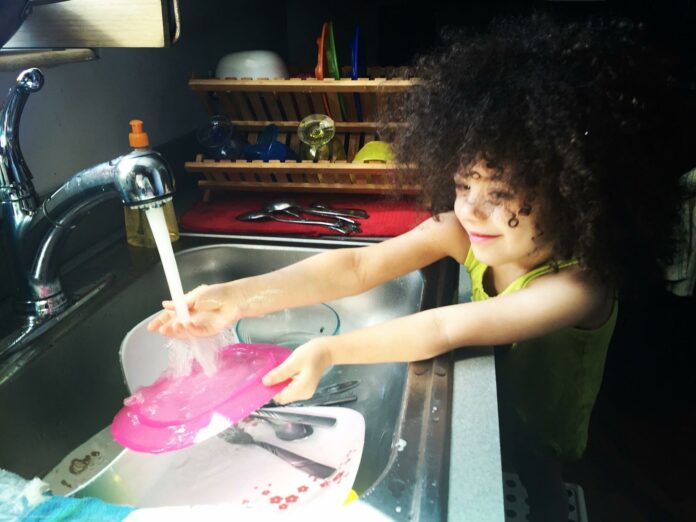Chores are an essential part of teaching kids responsibility and independence. Knowing how to care for themselves and perform basic life skills will set them on the right track for adulthood. But how do you know what chores are appropriate for your child’s age? For example, should my one-year-old throw his diaper away after he’s changed? How about my ten year old should they know how to mow the grass? If you could use a little guidance on age-appropriate chores for your child, just keep reading!
2 – 3 Years Old
Starting at age two, your toddler can perform basic chores mostly without assistance. By starting early, you teach your child chores are a normal part of life and not something they can choose not to do.
- Help pick their toys up and put them in the toybox
- Help feed the family pet
- Put dirty clothes in the laundry bin
- Help bring in light grocery items
- Turn lights off when leaving the room (with help if they can’t reach)
4 – 5 Years Old
Preschool-aged kids are incredibly motivated and excited to help with almost anything. Now is an ideal time to introduce a basic chore chart. You can use stickers or let them check off when they’ve completed their daily chores. It’s also an excellent time to begin the rewards process. If they complete every task for the week, they can get a toy or a special treat. Each child is different, and you can customize your system to suit their personalities.
- Make their bed
- Light cleaning like wiping down the counters
- Set the table
- Letting the family pet in and out to use the restroom
- Brushing teeth twice a day
6 – 8 Years Old
Now that your child is in school, they have responsibilities in their classroom as well. Ask your child what tasks they perform in class and try to build upon them to create consistency. It’s also the time to start introducing consequences for not completing their daily chores. Whether they lose screen time or aren’t allowed to do something they were looking forward to, stay strong and enforce the punishment. They will soon realize the importance of doing what they are required to do.
- Feed and water the family pet daily
- Fold and put away their laundry
- Clean their room
- Clean the windows
- Wipe down baseboards
9 – 12 Years Old
Enthusiasm for helping out around the house has usually disappeared by this age. As a result, you may find yourself having a more challenging time enforcing daily chores. Now is the time to update the chore chart to reflect a more mature system your child can follow. Instead of checks and stickers, make a list they can glance at to remind them what they must do that day. You can introduce an allowance as a reward for completing all their tasks for the week. It’s up to you to determine the amount, but it should be reasonable for the level of responsibilities they are required to complete.
- Daily personal hygiene (shower, brush teeth)
- Assisting with meal prep
- Load and unload the dishwasher
- Vacuum or sweep the floors
- Dust
13 – 18 Years Old
With teenagers, it’s important to consider the amount of school work and sports obligations they have. If they have a full plate, it may be wise to limit the number of chores they have to do daily. You can also incorporate on-demand responsibilities they can help with as the need arises. Incorporating real-world tasks like helping to fix a broken lawnmower blade or repairing a fence helps prepare them for independent living.
- Washing, folding and putting away their laundry
- Babysitting
- Preparing easy meals
- Washing the car
- Cleaning the bathroom
You can set your child up for success by introducing chores at a young age. You will help teach them responsibility and pride in accomplishing daily tasks. Remember, every child is different, and what may work for one may not work for another. Keep your child’s unique personality in mind when choosing an age-appropriate set of chores, and reward them in a way that will mean the most to them. As they grow, they will become responsible adults who know how to take care of themselves and the world around them.

